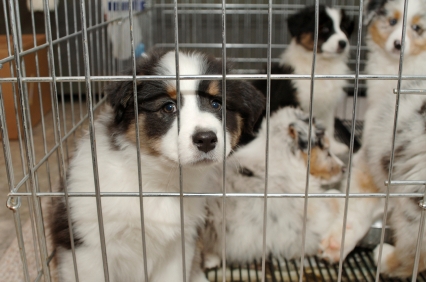Doggie Danger
Oprah Exposes Puppy Mills

It all started when Oprah Winfrey saw a billboard just off the Kennedy Expressway in Chicago that read, “Oprah: Do a show on puppy mills. The dogs need you.” Oprah took the billboard to heart and aired a show last week that revealed the horrific truths about puppy mills to millions of Americans. The man behind that billboard, Bill Smith, is the founder of Main Line Animal Rescue.
Puppy Mills 101
Puppy mills are breeding kennels, located mainly in the Midwest, that are notorious for their cramped, unsanitary conditions and their continuous breeding of purebred animals. Puppy mill kennels usually consist of wire-mesh cages kept outdoors where female dogs are often bred continuously without rest between heat cycles. The mother dogs and their puppies often suffer from malnutrition and lack of veterinary care and receive little, if any, human contact. The puppies are taken from their mothers at four to six weeks of age, and are sold to brokers who pack them into crates for transport to pet shops. The female dogs are typically killed once they stop producing litters. Unfortunately, puppy mill breeders are concerned more about the profit they make from puppies than the health and welfare of the animals.
According to the Humane Society of the United States, there may be as many as 10,000 puppy mills operating across the United States.
The Oprah Winfrey Show investigated Amish farms in Pennsylvania that were running puppy mills in their backyards. Wire cages filled with dogs were stacked on top of each other and even though the farms spanned over 60 acres, these dogs never stepped foot on grass. At one puppy mill, the farmer had his dogs running on wheels set in fan casings that looked like giant gerbil wheels. He claimed this helped them get exercise as they were never out of their cages.
Bill Smith and his volunteers rescue hundreds of unwanted puppy mill dogs and adopt them out to families. According to Smith, “A number of times they’ll call us and give us 45 minutes to an hour to come out and pick up a dog before they shoot it when they no longer want it. It’s always amazing to me when I go out to pick up a dog they’ve had for eight or nine years and it doesn’t have a name. It’s never been out of the hutch. It doesn’t know how to walk. I have to carry it to the car. It’s heartbreaking.” Smith said Main Line Animal Rescue has rescued approximately 7,000 to 8,000 animals-about 5,000 of those from puppy mills.
The U.S. Department of Agriculture is supposed to monitor and inspect kennels to ensure they are not violating the housing standards of the Animal Welfare Act; but kennel inspections take low priority at the USDA. In addition, many of these breeders are operating without a license and slip through the cracks of the USDA.
What You Can Do
Adopt instead of buy. If you’re looking to get a dog, check with your area shelters first. Not only will you be saving a life, but you will ensure that your money is not going to support a puppy mill. There are many dogs waiting for homes in shelters all across the country, and close to 20 percent of these dogs are purebred. If you are set on a particular breed and can’t find it at your local shelter, try a breed rescue group through petfinder.com.
Even Oprah is convinced to adopt next time. After the puppy mill episode aired, Oprah said: “I am a changed woman. I will never go anywhere else but a shelter.”
Research your local pet store. If you must adopt from a pet store, find out where the dogs are coming from. According to Main Line Animal Rescue, 99 percent of pet shop dogs come from puppy mills and if they state the animals came from the Midwest, it’s a good chance that it’s a puppy mill.
Beware of internet sales. Those who sell animals on the web are not held to the Animal Welfare Act regulations-and so are not inspected by the USDA. If you fall in love with a puppy through the internet, make a visit to the breeder in person.
Know how to recognize a responsible breeder. Responsible breeders have their dogs’ best interest in mind. If someone is a responsible breeder, they should be screening you just as you are screening them. Ideally, the mother dog should be part of their family. You should be allowed to see the breeding premises and be able to meet the mother of the puppies you are interested in. A responsible breeder will have health checks on all the puppies and will take them back for any reason if it doesn’t work out.
The animal protection community is extremely grateful to Oprah for exposing this major cause of pet overpopulation to a wide audience. With so many homeless dogs and cats being put to death every year in animal shelters, there is simply no reason for animals to be bred and sold for the pet-shop trade. Now that you are aware-you can spread the word!



